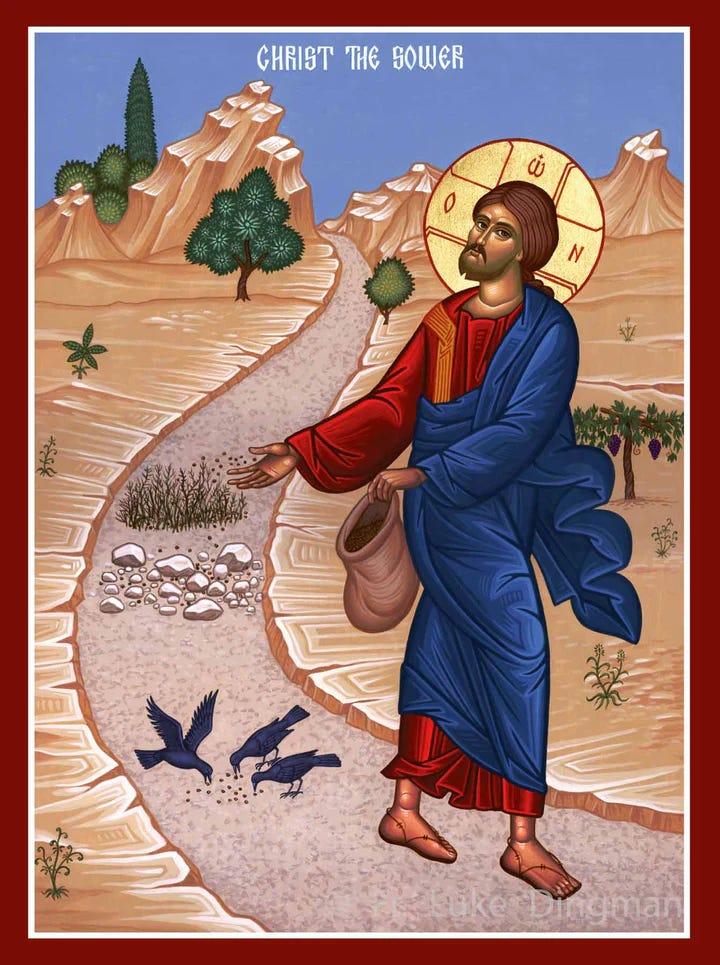“A parable is an earthly story with a heavenly meaning.” That’s an old saying from 18th century English Sunday School manuals. In times since, scholars have filled pages and even books studying the word 𝘱𝘢𝘳𝘢𝘣𝘭𝘦, its history and shades of meaning from Plato to Plutarch in the ancient world, on through the middle ages and down to the detailed word studies of the 20th century (yes I know and acknowledge it’s the 21st century but I’m not too impressed with much of the scholarship this century has thus far produced). With all that work done on this single word, however, nobody seems to have improved much on the old Sunday School definition.
The Parable of the Sower (“a sower went out to sow his seed”) comes to us from three Gospels: SS Matthew, Mark and Luke. St Luke’s account is the one appointed for Sexagesima. It’s the shortest and most to the point. If we take our Sunday School adage as a guide, this is a story about a farmer planting seeds and what happens to them. Since it’s a parable, though, the farmer, the seeds and the soil all point us to another meaning.
After the crowds have gone, the Lord’s disciples ask Him what the parable means. Turns out the parable isn’t about the sower or even the seeds as much as it’s about the dirt. Many of the seeds the sower tosses as he walks through the field fall on unwelcoming ground. Hard-packed, encrusted with stones or thick with the thorn bushes so prevalent in Palestine, this soil will never produce: the seeds will die. But some of the seed will thrive and produce an abundance of the farmer’s crop. The “heavenly meaning” of the parable has to do with the different kinds of dirt, and the dirt stands for us. That’s meet and right, ‘cause the Bible says God made you and me out of dirt.
Some of the seeds fell on the road that ran alongside the farmer’s field, hard-packed from long years of people walking over it. The seed is gobbled up by hungry birds. Some of the seed fell on rock-strewn, unplowed surface ground; that seed burned up in the hot sun. Some of the seed fell among thorn bushes (which can grow taller than a man and spread out three or four feet from the bush’s roots) and never got a chance to grow. But a lot of the seeds, let’s hope 𝘮𝘰𝘴𝘵 of them, ended up in the upturned, waiting earth the farmer had plowed and cultivated. That seed burrowed into the earth, grew, burst forth in bloom and produced the rich harvest the sower had hoped for.
So you and I are the dirt, and God plants Himself (He is both Sower and Seed) in us. The fruitfulness of His planting depends on the quality of the dirt itself.
Why this Gospel for Sexagesima, ten days from the beginning of Lent? Because 𝗻𝗼𝘄’𝘀 the time for you to consider what kind of dirt you are. And if you’re dirt that’s hard-packed, rock-bound or too thickly-thorned, if there’s no room for God to grow, then Lent is 𝘁𝗵𝗲 time to do something about it. Clear the field, pull up the stones, improve the soil of your soul. It’s no accident we’re made out of dirt: God means for us to be fertile. The “heavenly meaning” of that is that God can grow in us, and we can grow in Him.
What does that mean, for God to grow in us? What does it look like, if we grow in Him?
Lent, spiritual growth in Christ, isn’t an esoteric concept; Lent is blunt. It’s meant to be. Pray. Fast. Give away your precious stuff. It’s not about feeling but doing. Christian love has NOTHING to do with feeling love for others, as if they were your cuddly pets or cute newborns. Christians learn what love is by looking to Jesus Christ and His saints. What did Jesus’ love look like? What did it do?
As He hung on the cross, nailed to the wood with iron spikes, beaten pulpy and covered with blisters and bleeding, stinging wounds, He looked through His blood-encrusted eyebrows and saw all the people who’d done this to Him, sneering and laughing at Him. “Hey! Hey! mister big messiah! Come on down here right and show us who’s boss!” The One Who created each one of these creeps looked down at them and saw what they’d made of themselves to do this to one of their own. He saw and felt their hatred, took it 𝘢𝘭𝘭 in and then answered, with a prayer. “Forgive them, Father.” That’s the love He calls us to, the love that can change us and the world around us. It’s the seed He looks to plant in us, with intent that it will grow.




